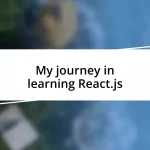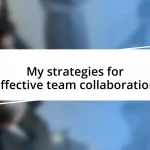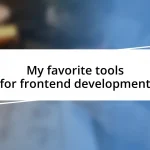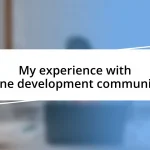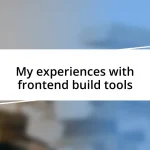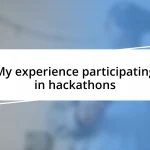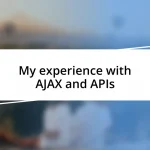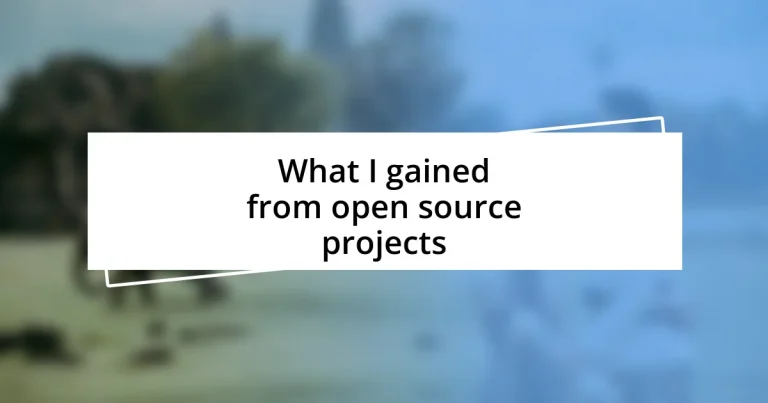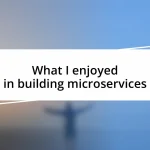Key takeaways:
- Contributing to open-source projects fosters technical and non-technical skill development, enhancing programming, problem-solving, and teamwork abilities.
- Open-source collaboration builds a global professional network, leading to meaningful relationships and unexpected career opportunities.
- Real-world experience from these projects cultivates adaptability, time management, and a continuous learning mindset, enriching personal and professional growth.
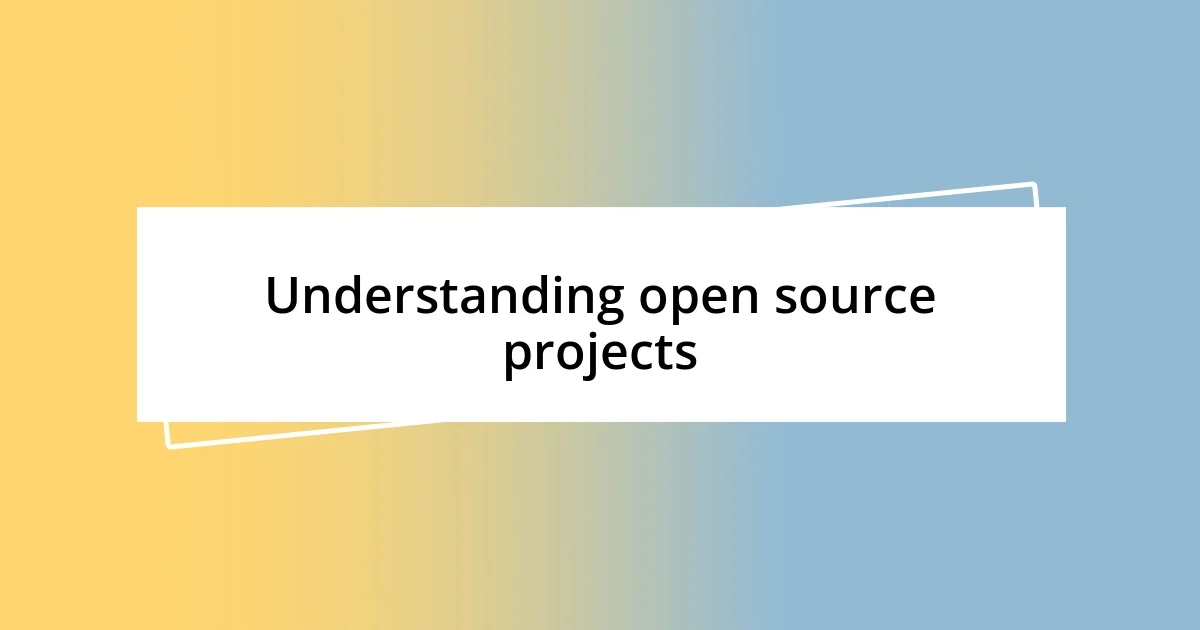
Understanding open source projects
Open-source projects are often collaborative efforts where developers come together to create software that anyone can use, modify, and share. I still remember the excitement I felt when I first contributed to an open-source project; it was like being invited to join a global community of like-minded individuals who shared my passion for coding. Isn’t it fascinating how these projects can integrate diverse perspectives and skills to create something greater than the sum of its parts?
What strikes me the most about open-source projects is their intrinsic transparency. Anyone can see the code, suggest changes, or report issues, fostering a sense of trust and ownership within the community. I recall a moment when a bug I reported was fixed by the main developer within hours; that immediate impact left me feeling empowered and valued, driving home the idea that every contribution matters. Have you ever wondered how it feels to know your input can shape software used by thousands of people around the globe?
Furthermore, open-source projects often serve as excellent learning platforms, where individuals can sharpen their skills in a practical environment. I distinctly remember diving into a coding language I was unfamiliar with while contributing to one project. The combination of practical problem-solving and community support accelerated my learning much more than any traditional course I’d taken. Isn’t it amazing how real-world experience can teach you far beyond textbooks?
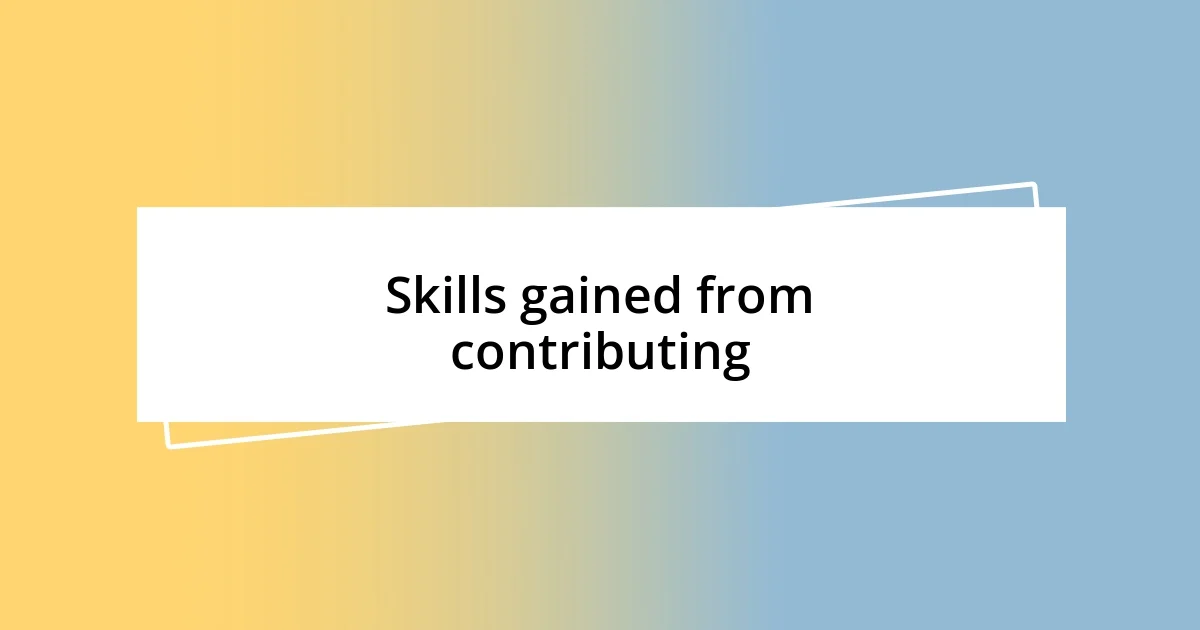
Skills gained from contributing
Contributing to open-source projects has allowed me to develop a variety of technical and non-technical skills. Working on collaborative coding tasks pushed me to refine my programming abilities, and I remember feeling a rush of accomplishment every time I successfully resolved a complex issue. Beyond the technical know-how, I also learned the importance of effective communication and teamwork, as I collaborated with people all over the world, sharing ideas and feedback.
Here’s a list of skills I gained from my open-source contributions:
- Technical Proficiency: Enhanced coding skills in different languages and technologies.
- Version Control: Gained hands-on experience with tools like Git.
- Problem-Solving: Developed the ability to troubleshoot issues under pressure.
- Collaboration: Learned to work effectively in a team with diverse perspectives.
- Project Management: Experienced the ins and outs of managing tasks and timelines.
- Community Engagement: Cultivated a sense of belonging through shared goals.
- Feedback Acceptance: Improved my ability to give and receive constructive criticism.
Even small contributions can lead to significant personal growth. I recall a moment when I took part in a code review and received feedback that challenged my coding style. Initially, I felt defensive, but over time, I appreciated the opportunity to improve. This experience reinforced the idea that growth often comes from stepping out of my comfort zone and embracing feedback from others.
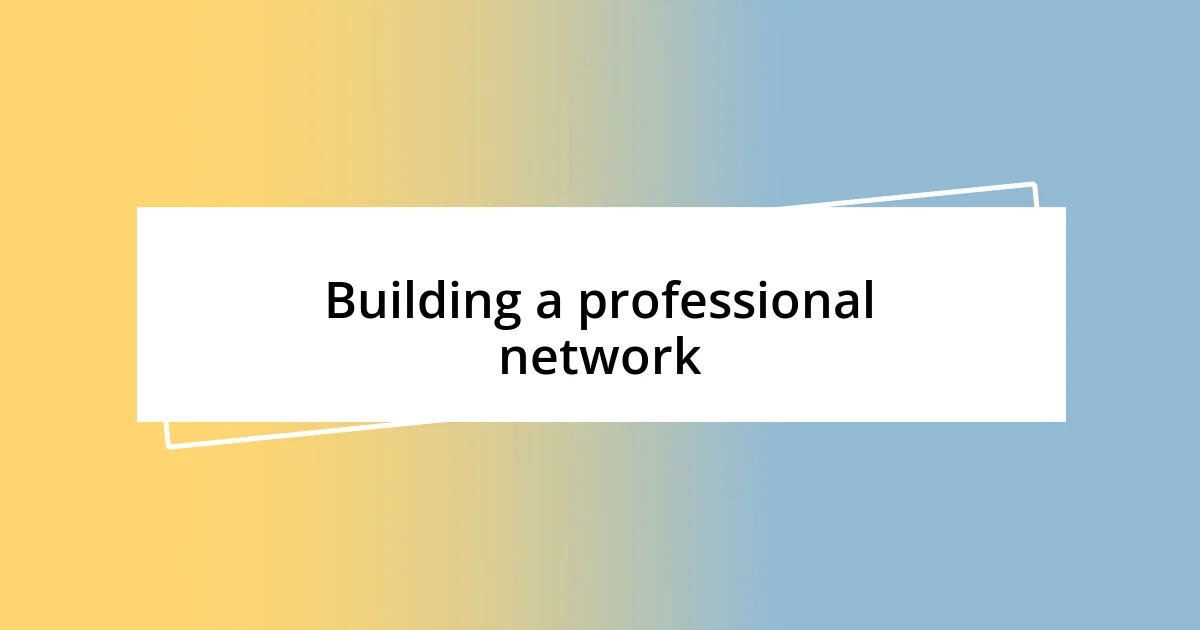
Building a professional network
Building a professional network through open-source projects has been one of the most rewarding aspects of my journey. Each contribution allowed me to interact with fellow developers, designers, and project managers from various backgrounds. I vividly recall one evening chatting with a contributor from Brazil, sharing our favorite coding practices and tools. That casual conversation turned into a deep friendship, proving how global collaboration can lead to meaningful connections.
Joining open-source communities often means participating in forums, chat rooms, or even social media groups. I remember my first experience on a project’s Slack channel, where I hesitated to ask a question. But when I finally did, the overwhelming support and quick responses made me feel included. This kind of camaraderie not only nurtured my confidence but also expanded my network beyond geographical limitations. Have you ever thought about how a single step can open doors to relationships you never imagined forming?
Moreover, the visibility these projects provide can lead to unexpected opportunities. I once received a LinkedIn message from someone who noticed my contributions to a particular project. This led to a freelance job that significantly boosted my career. Open source doesn’t just connect you with peers; it also showcases your skills and passion to potential employers. Isn’t it intriguing how a small code change can lead to profound professional growth?
| Professional Networking Opportunities | Traditional Networking Methods |
|---|---|
| Global connections with diverse talents | Local connections within confined spaces |
| Peer support and collaboration | Formal introductions and events |
| Showcase of skills through contributions | Resumes and cover letters |
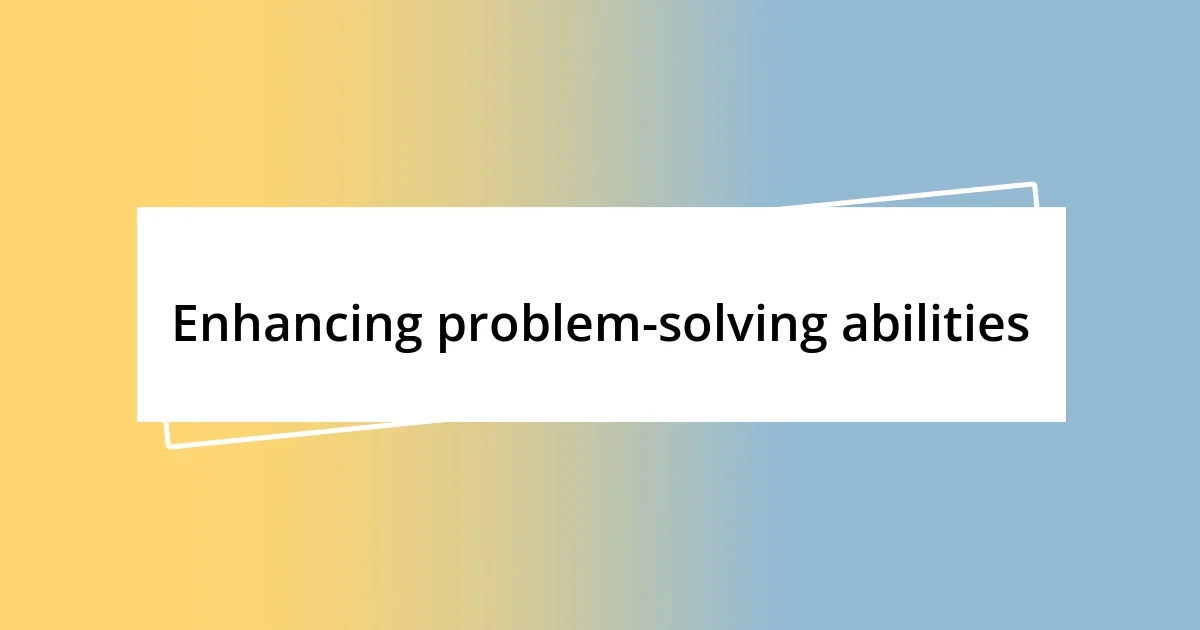
Enhancing problem-solving abilities
When I first dived into open-source projects, I underestimated how much my problem-solving abilities would sharpen. Each bug I encountered felt like a puzzle that needed my utmost attention and creativity to solve. I remember one evening, after hours of wrestling with a particularly stubborn issue, the sense of relief and triumph I felt when it finally clicked into place was unforgettable. Have you ever felt that rush when a complex problem unravels before your eyes?
Facing a variety of challenges in open source taught me to analyze issues from different angles. I quickly learned that sometimes the simplest solutions are the most effective. There was a time when I struggled to find a solution for a recurring error message, only to discover that a small configuration tweak resolved it almost instantly. This experience taught me that sometimes stepping back and reassessing the situation can lead to breakthroughs. Isn’t it fascinating how clarity can come from the most unexpected moments?
Additionally, collaborating with others on these projects pushed me out of my comfort zone and exposed me to diverse thought processes. Each time I worked on a team, I witnessed different approaches to problem-solving, which expanded my own toolkit. I distinctly remember a brainstorming session where a teammate’s unconventional idea sparked a path I hadn’t considered before. This collaborative energy not only invigorated my own thinking but made me realize that tackling problems with a team can yield efficiencies I couldn’t achieve alone. Can you relate to the empowering feeling of collective problem-solving?
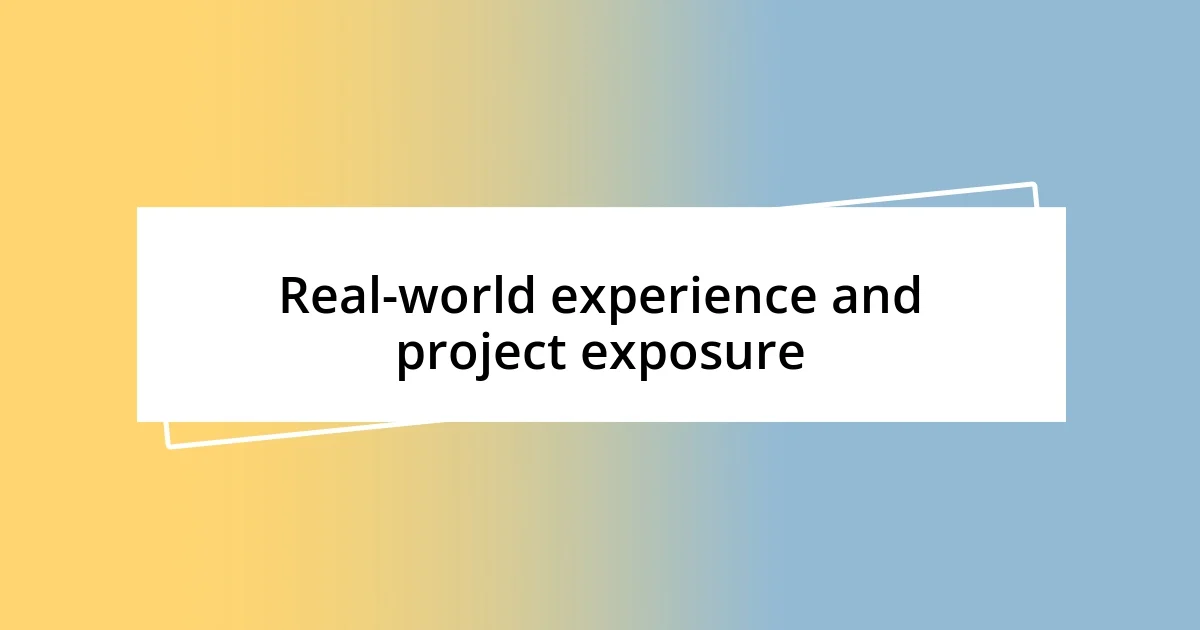
Real-world experience and project exposure
Jumping into open-source projects offered me invaluable real-world experience that I never anticipated. I recall my first contribution involving a feature request that was really a leap of faith for me. As I grappling with integrating my changes, I quickly realized how similar it felt to working on a real-world application where user needs and technical limitations collide. Have you ever worked on something that made you feel like you were finally part of a bigger picture? That’s exactly how I felt, and it deepened my understanding of software development dynamics.
The exposure to actual projects allowed me to face real deadlines and responsibilities. I still remember the adrenaline rush of meeting my first project deadline, where I stayed up late to ensure everything was polished and ready for review. That moment taught me the true importance of time management and clear communication, especially when coordinating with a dispersed team. It’s amazing how pressure can motivate you to elevate your work quality, isn’t it?
Moreover, the diverse projects I encountered highlighted the various methodologies and tools used in the industry. Working on one particularly agile project opened my eyes to continuous integration and deployment practices. The instant feedback loop from automated tests was a game changer for me. It made me realize just how crucial it is to adapt to ever-evolving technologies. Have you ever experienced a shift in perspective that completely reshaped how you work? These projects provided me not only with a toolkit of skills but also a refreshing take on adaptability in professional settings.
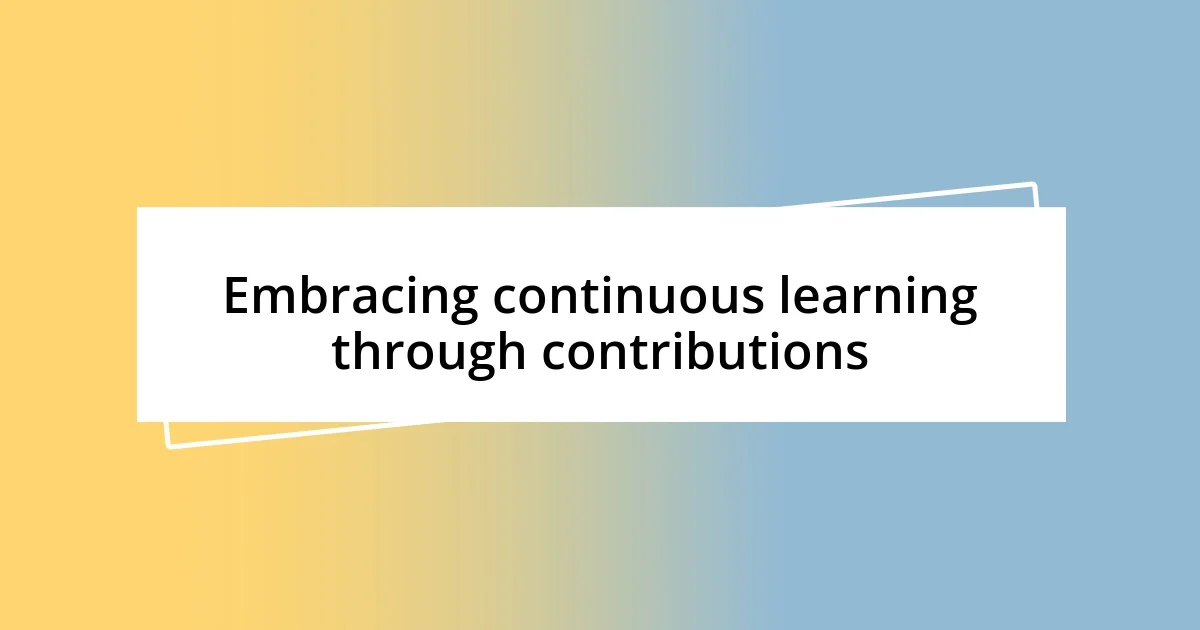
Embracing continuous learning through contributions
Embracing continuous learning became second nature as I contributed to open-source projects. Each contribution felt like a mini-experiment in my learning journey. I remember fiddling with a codebase late one night, realizing that diving deeper into documentation was the key to unraveling a challenge. Have you experienced that moment of enlightenment when understanding dawns? It’s like a light bulb flickering to life, illuminating a path that seemed daunting just moments before.
As I engaged with the community, I often found myself seeking guidance from those with more experience. One instance stands out when I reached out for help on a complex feature I was trying to implement. The mentor who responded didn’t just provide answers; they shared their thought process, helping me grasp the underlying principles that guided their decisions. I often wonder, how much faster would my learning curve have been without that interaction? It’s those insights that have shaped my perspective on absorbing new knowledge.
The thrill of learning didn’t stop with just coding. Participating in discussions and code reviews also offered profound lessons. I still recall a vibrant debate over implementing a new feature—different opinions clashed, and yet, it was within that tension that I learned to articulate my thoughts more precisely. Isn’t it fascinating how disagreement can become a catalyst for personal and professional growth? Engaging with diverse viewpoints has not only enriched my expertise but also cultivated a genuine appreciation for continuous learning in collaborative environments.
